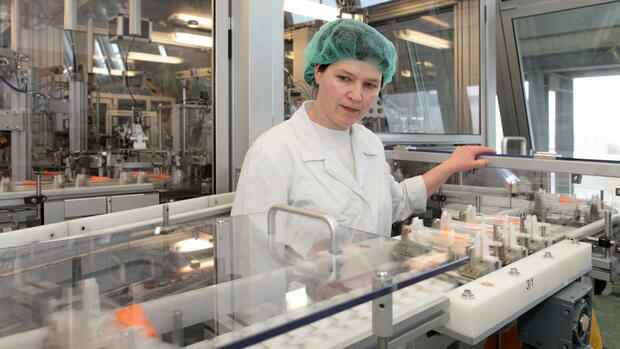Rising raw material, transport and energy costs are also a burden for medical technology companies in Germany.
Frankfurt After a slump in sales in the first corona year, demand for medical devices is recovering for the second year in a row. The industry in Germany expects to grow a little faster this year at 3.3 percent than in the previous year.
Significantly increased costs are depressing the result: only eleven percent of the companies expect an increase in profits this year. These are the main results of a survey by the industry association BVmed, in which 120 companies took part.
Medical technology in Germany employs more than 235,000 people and has a turnover of around 36 billion euros. The majority of manufacturers are small and medium-sized companies. According to an industry survey, around 61 percent of the companies surveyed expect higher sales this year than in the previous year.
This is a slightly better result than in the previous year (57 percent) and significantly better than in the first year of the corona crisis (24 percent). However, the values do not reach the level before the corona pandemic, when more than 70 percent of the companies expected increasing sales.
Top jobs of the day
Find the best jobs now and
be notified by email.
Around 62 percent of those surveyed assume that their profits will decrease in the current year. The most important reasons for this are the sharp rise in transport, raw material and energy costs. There are also problems with suppliers and supply chains, rising labor costs and additional costs due to the implementation of the new EU Medical Devices Directive (MDR). This has been in effect since May 2021 and was intended to make medical devices safer after the scandal surrounding faulty breast implants more than ten years ago.
Certification of medical devices becomes a problem
Manufacturers have to subject their products to extensive certification. They must document the manufacture of their products, provide evidence of extensive clinical studies before they are launched on the market and have the product checked during its use. All this applies to new as well as already approved products. Existing permits expire in 2024 at the latest.
We need further, concrete and above all pragmatic measures and corresponding legal certainty as soon as possible. Meinrad Lugan, CEO of BVMed
However, it has been apparent for some time that the certification for the 450,000 medical devices approved in Europe can no longer be achieved in time. Not only because the process is so lengthy, but also because there are bottlenecks at the state-authorized bodies that carry out tests and evaluations of medical devices.
Medical societies and manufacturers therefore warn of supply bottlenecks for products if certification can no longer be carried out in good time. In addition, the specialist societies fear that some companies could then take clinically important existing products off the market, since the high cost of recertifying older products is often disproportionate to the sales proceeds.
A coordination group in Brussels is now working on solutions, for example to create more capacity at the authorized registration offices. But time is pressing: “We need further, concrete and above all pragmatic measures and appropriate legal certainty quickly,” says Meinrad Lugan, CEO of BVMed and board member of the family holding company of the medical device company B. Braun.
The association suggests, for example, using old evidence of products for the certification process for which the requirements do not differ from those of the MDR. According to an industry survey, 80 percent of medical technology companies call for a pragmatic handling of the MDR system with existing products.
Overall, it can be seen that the cost increases and bureaucratic obstacles are leading to a decline in innovation dynamics. According to the survey, the industry’s innovation climate index has reached a low of 3.6 on a scale of up to ten. To strengthen the industry, the association is also calling for a uniformly reduced VAT rate of seven percent on medical products.
More: Medical device manufacturers warn of bottlenecks due to EU regulation
